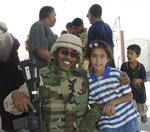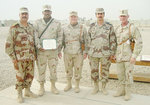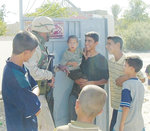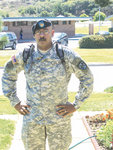



Sief Mahagoub gushes with American pride, but he hasn’t always lived in the land of the free.
Mahagoub’s journey to America began when he fled his homeland – Eastern Sudan – during its first war. He left behind his parents, 15 siblings and a poor childhood full of barefoot hunger and fear.
After fleeing, he lived in an Ethiopian refugee camp before crossing the border into Egypt and being accepted as an urban refugee into Japan, where he spent nine years.
“The first two years were very hard because I’m a big black dude. I don’t know the language, so anything I say goes nowhere,” he said.
Mahagoub attended two hours of school each day, then commuted two hours to work 12-hour shifts building bridges over Japanese sprawl. He hardly had time to sleep, shower and finish his homework.
“In Japan, everything is small. Their tools are small. Their beds are small. Their McDonald’s meals are small,” he said.
Being an Arabic-speaking “big black dude,” Mahagoub made his own clothes, sewing two or three tiny Japanese shirts together to make one that fit.
He learned the language and after two years in construction, Mahagoub applied to Temple University, where he studied computer science. He got a job as a network technician for a large Japanese corporation.
In 1999, he met a friendwho brought him to the U.S. – specifically Milford – where he became a citizen and started working as a liaison for Lincoln Public Schools’ district office.
“I helped new refugees who speak Arabic to orient them into the school district,” he said.
That orientation covered everything from the merging of home life and school life – something not done in Sudanese culture – and lessening refugees’ fears of immunizations.
“They’re afraid of any kind of injection. They think it’s trying to hurt them or paralyze them,” Mahagoub said.
The University of Nebraska–Lincoln then offered him a job in Extension teaching health literacy to refugees. He worked to change cultural norms regarding illnesses and taught people to wash their hands.
“It was a challenge. Things like flushing toilets and washing hands, they feel guilty. They think using that much water is wasteful,” Mahagoub said. “To take that guilt away took a lot of intensive lecturing and training.”
During his time at UNL, the September 11, 2001, terrorist attacks unfolded, and one of Mahagoub’s colleagues was called to duty.
“We were creating a video for refugees on how to get rid of head lice,” Mahagoub said. “The producer of the video we were working with called me and said he was leaving, but this other guy was going to take his place. I said, ‘Where you going?’ and he said, ‘I’m going to war. My unit has been mobilized.’ I said, ‘What is mobilization?’ and he said, ‘The federal government is asking me to go fight for our country.’ And that’s when I understood about the Army.
“It bothered me.”
Mahagoub couldn’t forget about his colleague leaving, so he went to a local Army recruitment office.
“Everybody wanted to join,” he said. “There were long lines outside the office.”
He waited a year, then went back to the office only to be told they weren’t hiring.
“They were only hiring certain MOS (military occupational specialties),” he said.
He went home, learned the Iraqi dialect of Arabic and returned to the office once more in 2003.
“‘But you’re old,’ they said. And I said, ‘I speak Arabic.’ ‘Oh,’ they said. ‘When do you want to join?’ I said, ‘Right now.’”
Within a week, Mahagoub’s paperwork was filed and he completed his medical tests and physical.
He shipped out to Fort Sill in Lawton, Oklahoma, and then to Fort Jackson in Columbia, South Carolina, before moving one more time to Fort Hood, Texas. Though he spoke fluent English, he struggled to master the military vocabulary.
“I was standing in line and they said, ‘About face.’ Everybody turned to face the other way and I’m still standing there waiting for the story about the face,” Mahagoub said, laughing.
Words like “bunk” for “bed” and “canteen” for “the thing you drink water out of” led him to create his own glossary of military terms to review over and over.
“Basic training was hell,” Mahagoub said, but it was nothing like what he experienced once his unit deployed to Iraq.
“It was hot. It was dusty,” he said. “It was ugly and it was loud. It was a clear sense of war.”
While there, the name tag on Mahagoub’s uniform read “Lincoln” instead of his real name to help keep him safe and not give an indication that he could speak the Iraqi language.
Instead of interpreting what the enemy was saying, he would listen to their plans of attack and help arrange pre-emptive strikes for the U.S.
But his time in Iraq wasn’t all bombs and killing, he said. His unit built a school and a new water system for the Iraqis.
“It was part of winning the hearts and minds. We like to do something good while we’re there,” Mahagoub said.
Seeing the kids without shoes, running water or much food tugged with fervor at his heart.
“It was very personal,” he said.
He started a campaign for the U.S. to send shoes, blankets, clothing and school supplies to deliver to Iraqi children.
“We collected 180 pairs of shoes. I was so thrilled,” he said. “They were very appreciative. They just love you for who you are as a good person.”
Life changed when Mahagoub returned to the U.S. in 2010. His unit touched down in Dallas, where he immediately sought out three large orders of McDonald’s fries and a Sprite – something he missed most overseas – then rented a car to drive back to Milford.
Still in his uniform, He stopped at a filling station in Kansas for gas, a donut and a cup of coffee.
“I came to pay and they said it was already paid for,” Mahagoub said. “I asked, ‘By who?’ and it was by a cowboy-looking guy with a hat and blue jeans and a Copenhagen can right there in his pocket. Then he was just gone. I couldn’t catch him to say thank you. It brought so much joy to me that I mattered.”
On the drive home, Mahagoub turned on the radio to hear station hosts discussing the Michael Jackson molestation case.
“It upset me. Here we are a country at war and they’re talking about Michael Jackson instead of the war,” Mahagoub said. “I mattered more to the American people than to the media.”
He finally made it to Milford and, for a brief moment, he was excited.
“I was happy to be home, to see the family and the dog, you know, but I wasn’t there,” he said.
His arrival marked the beginning of several years of post-traumatic stress disorder (PTSD), something Mahagoub said he could never talk about.
“I woke up in the middle of the night and checked to make sure everything was locked. We’d go out to a restaurant and I’d always have my back to the wall. I didn’t like doors behind me,” he said. “I trust, but I always verify and am always alert.”
But he wasn’t just nervous around people.
“I come home a different person. I can’t eat steak because it reminds me of the burned bodies and the smoke. Thunderstorms are always too much for me if I’m asleep. The Fourth of July is ugly,” he said.
Mahagoub stopped watching the news because of reports of dead soldiers, and the color red triggered gruesome memories of blood.
“You leave war, but war doesn’t leave you,” he said.
His skin began to peel because of malnutrition, and his refusal to socialize after the war affected his marriage and family.
“The military didn’t do a good job of preparing family members, telling them that we come home different,” he said.
The military frowned upon talk of PTSD, Mahagoub said, so his stress was getting worse instead of better.
“I couldn’t do it anymore.”
He admitted himself to a local Veterans Administration hospital for help, but the hospital was not equipped to treat his condition.
“They had me on 28 different kinds of medication every day,” Mahagoub said. “I was a walking zombie.”
Instead, he tried Cognitive Processing Therapy (CPT), which helped him regain control of his life.
“It’s a brutal 12-week program where you confront your demons. You rewrite your trauma account every week, and they walk you through how to compartmentalize it. I encourage all veterans to go through it,” he said.
Now, Mahagoub is back to eating meat, telling himself it comes from Kansas, not the battlefield. He sees the color red as a product manufactured in China, not shed blood.
He currently works as a campus supervisor at Southeast High School in Lincoln, talking with students and, more importantly, listening to them to help them talk through their own problems.
He’s thinking of getting his PhD in migrant child education and writing books to help drive migrant children and refugees toward better lives.
Every three years, Mahagoub visits his family in Eastern Sudan, where he said conditions aren’t as bad as they used to be. He takes suitcases of clothes and multivitamins for them. He bought his family a home and cars, and he Skypes with them. He helped pay for extended family’s weddings and college tuitions. He gives money to buy eyeglasses for people in his village.
Though his journey to the U.S. stretched years and endured detours, Mahagoub has one simple message for Americans:
“Tell the people there are some invisible heroes. They stood up and they fought, and they’re among us,” he said. “I’ve done all this for America, a beautiful country that gave me democracy and freedom of choice. I can choose to live anywhere. I can choose to apply for any job. I can vote for whoever I want. I am safe. If you are an immigrant and you come here, you need to do something. We need to share the burden. I don’t want to go back. I love it here.”